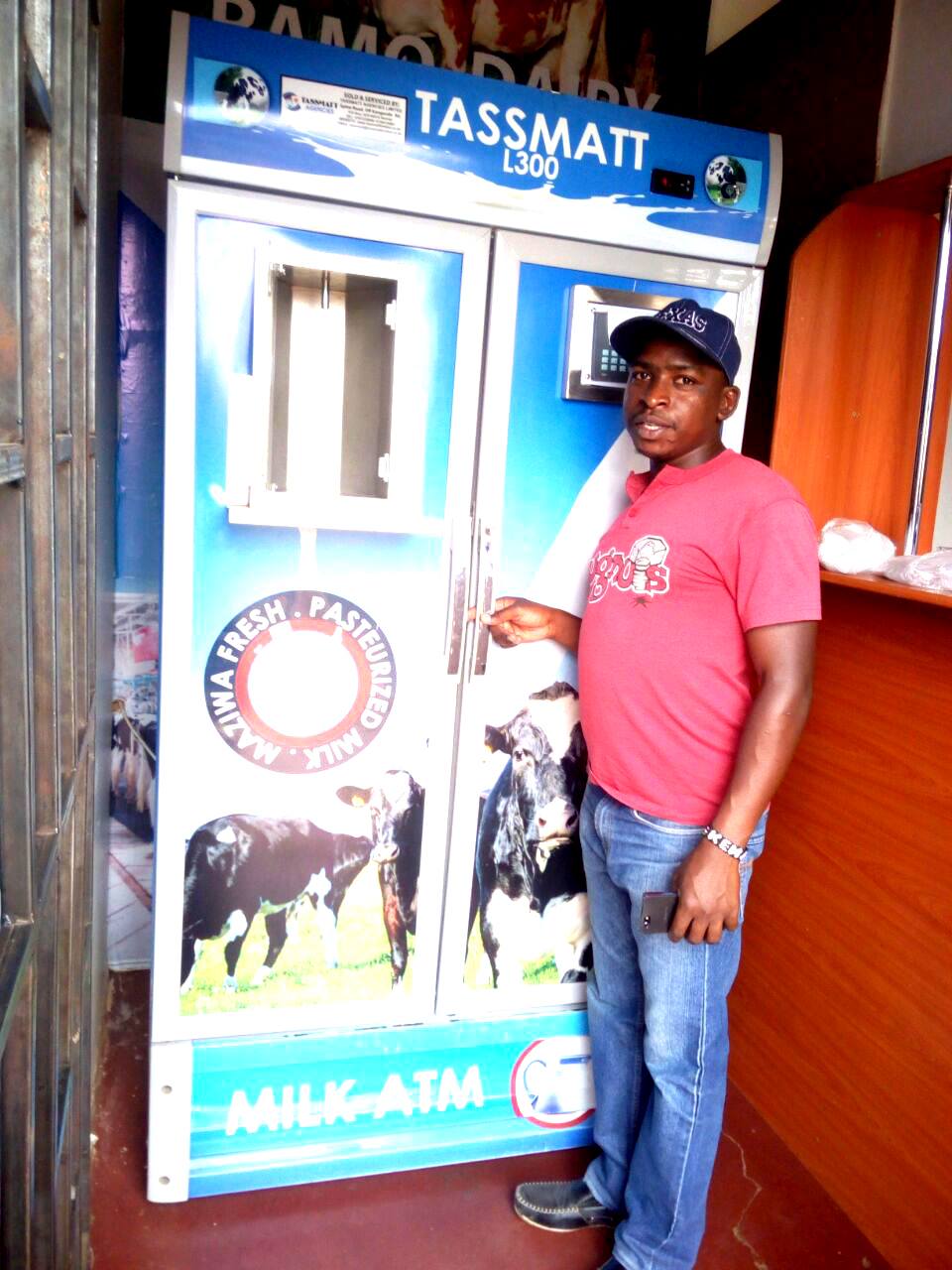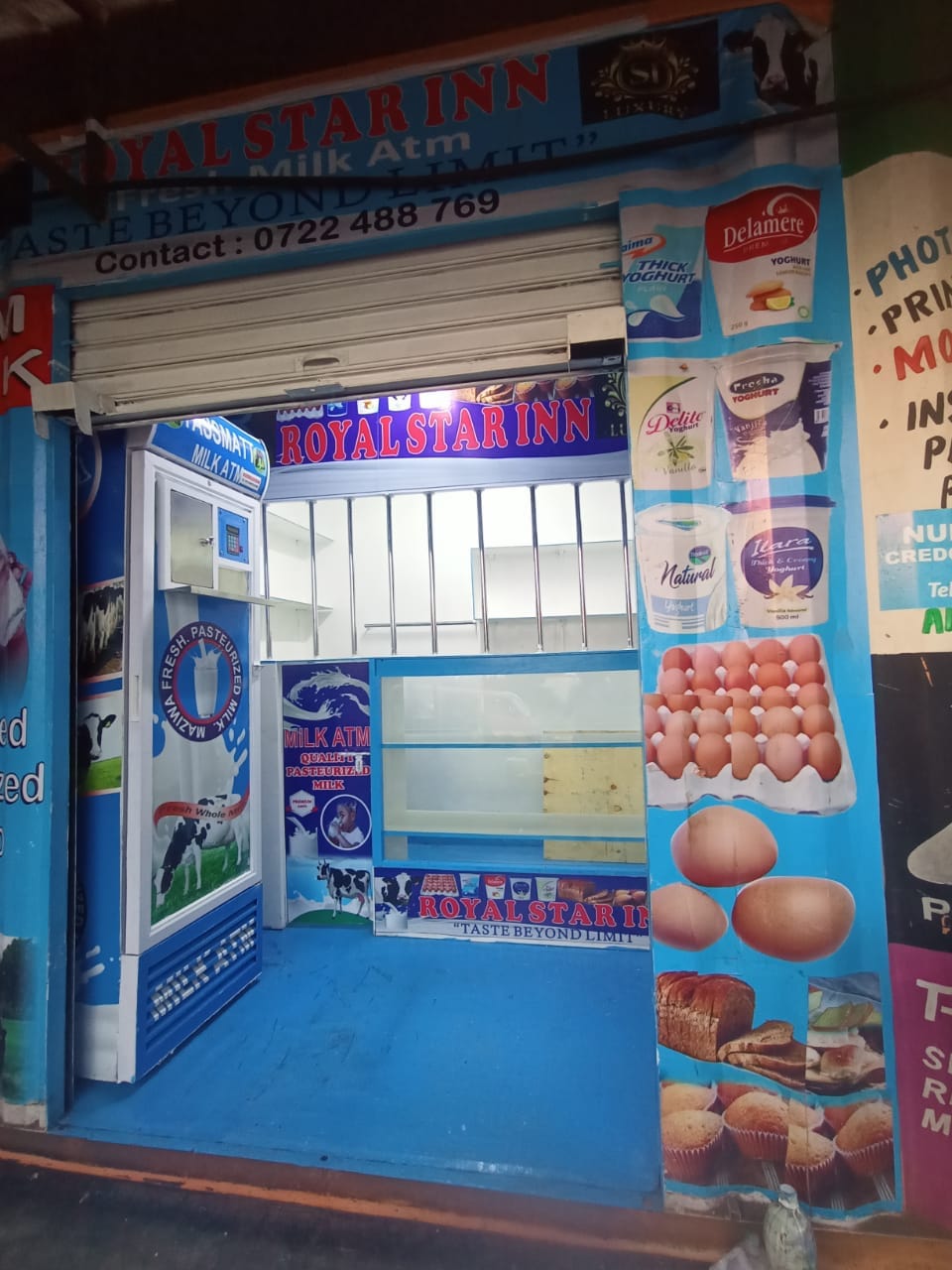It was a day like this back in 2020 when we got a call requesting for direction to Tassmatt’s Showroom. The customer arrived and was overjoyed upon seeing what he wanted, Milk ATMs & Cooking Oil ATMs. Our sales team wizards took him through the entire business setup and a brief on business planning. Two weeks after the customer – John Njogu – came back paid for a brand new 300L milk ATM and a 40L Cooking oil atm machine. We delivered and installed the machine in Nairobi at a new shop.
John would later start a small supermarket from sales of he had generated from vending ATMs that would later turn to be a beginning journey of a successful entrepreneur.

The Idea
John had a regular job and a simple life, but he always had big dreams and aspirations. According to him, one day, while he was on his way back home from work, he realized that he had run out of milk. It was late at night, and all the nearby stores were closed. But then he remembered that there was an ATM nearby that dispensed milk, so he decided to give it a try.
When he arrived at the ATM, he was surprised to see a long line of people waiting to buy milk. But he didn’t let that discourage him. He patiently waited his turn, and when he finally got to the front of the line, he was impressed by how easy and convenient the process was. It was at that moment that John had an epiphany. He realized that there was a real need for convenient, 24-hour shopping options in his town.
With this idea in mind, John started doing some research and soon discovered that there were very few supermarkets in the area, and none of them were open by 9pm. He decided to take a chance and open his own supermarket that would cater to the needs of the community. It was a risky move, but John believed in his idea and was determined to make it work.
He started small, investing his own savings into the business and slowly building it up over time. At first, it was a struggle. He had to work long hours and put in a lot of effort to keep the business going, but he never gave up. He constantly listened to feedback from his customers and made changes to his store accordingly. He also kept an eye on his competitors and made sure that he was offering something unique and valuable to his customers.
Over time, John’s supermarket grew in popularity. People loved the convenience of being able to shop at any time of the day or night, and they appreciated the high-quality products and friendly service that John and his team provided. As the business grew, John was able to invest more money into it, expanding his inventory and hiring more staff. He also started to think about ways to differentiate his store from others in the area, such as offering organic and locally-sourced products.
Before he knew it, John had become a successful entrepreneur. His supermarket had become a staple in the community, and people from all over the town came to shop there. John was proud of what he had accomplished, but he never forgot his humble beginnings. He knew that it was his determination, hard work, and willingness to take risks that had led him to where he was today. And he was grateful for that fateful night when he had run out of milk and had stumbled upon the idea that would change his life forever.
As the years went by, John’s supermarket continued to thrive. He expanded his business even further by opening up new locations in neighboring towns. He also started to explore online sales, which allowed customers to order groceries from the comfort of their own homes and have them delivered directly to their doorstep.
With each new success, John continued to reinvest in his business, expanding his inventory and offering new services to his customers. He also became involved in the community, sponsoring local events and donating to local charities. Through his hard work and dedication, John had become a respected member of the community, and his supermarket had become a beloved institution.
Looking back on his journey, John was proud of all that he had accomplished. He had gone from a simple purchase at an ATM to becoming the owner of a successful supermarket chain with Milk ATMs and Salad ATMs from Tassmatt Limited. But he knew that his success was not just a result of his own hard work and determination. It was also thanks to the support and loyalty of his customers, as well as the dedication of his team. He was grateful for everyone who had played a role in helping him achieve his dreams inclusing the Tassmatt Team.
Today, John’s supermarkets continue to thrive, offering high-quality products, convenient hours, and exceptional service. And John continues to be an inspiration to others, showing that with hard work, determination, and a little bit of luck, anyone can achieve their dreams.
The business of milk and cooking oil atm in Kenya
Kenya is one of the most developed countries in East Africa and has a diversified economy. Agriculture is the backbone of the Kenyan economy, accounting for 24% of the country’s GDP, with the majority of the population relying on farming as their primary source of income. Among the agricultural products, milk and cooking oil are two of the most essential and profitable businesses in Kenya.

Milk Business in Kenya:
Kenya has a thriving dairy industry that has been growing steadily over the years. The country has a high demand for milk and milk products, with the majority of the population consuming milk daily. This has led to the establishment of several milk processing companies, both large and small-scale, to meet the demand for milk and milk products.
Milk production in Kenya is concentrated in specific regions of the country, with the leading milk-producing regions being Central, Rift Valley, and Western Kenya. The dairy industry employs over 1.5 million people directly and indirectly, making it a significant contributor to employment and income generation in the country.
The profitability of the milk business in Kenya largely depends on the supply and demand dynamics of the market. The price of milk is relatively stable throughout the year, with slight variations depending on the season. The cost of production, which includes animal feeds, labor, and veterinary services, also affects the profitability of the milk business.
Cooking Oil Business in Kenya:
Cooking oil is another essential commodity in Kenya, with a high demand in both rural and urban areas. The cooking oil industry is dominated by a few large-scale companies, with some small-scale players also operating in the market. The most common types of cooking oils in Kenya are vegetable oils, which are made from locally grown crops such as sunflower, soybeans, and cotton.
The profitability of the cooking oil business in Kenya is also influenced by market demand and supply dynamics. The cost of production, which includes the cost of raw materials, labor, and processing, also plays a significant role in determining profitability.
Challenges
However, there are some challenges that can affect the profitability of these businesses in Kenya. One of the significant challenges is the high cost of production inputs such as animal feeds and fertilizers, which can lead to a rise in the cost of production and a decrease in profitability.
Another challenge is the competition from imported products. Kenya has liberalized its market, allowing for the importation of milk and cooking oil products. Imported products are usually cheaper, and this can affect the demand for locally produced products, which can lead to a decrease in profitability.
Moreover, the milk and cooking oil businesses in Kenya are also affected by climate change and environmental factors. Climate change can lead to a reduction in rainfall, which affects the quality and quantity of animal feeds, leading to a decline in milk production. Also, the cooking oil industry is dependent on crops, which are sensitive to environmental factors such as rainfall and temperature.
To mitigate these challenges and ensure profitability, businesses in the milk and cooking oil industry must adopt innovative and sustainable business practices. For instance, businesses can invest in modern technology to increase efficiency and reduce the cost of production. They can also engage in sustainable practices such as conservation agriculture and sustainable animal husbandry to reduce the environmental impact of their activities.
The milk and cooking oil businesses in Kenya are essential and profitable sectors of the economy. However, they face challenges such as competition from imported products, the high cost of production inputs, and environmental factors. To ensure profitability, businesses in these sectors must adopt innovative and sustainable business practices that can increase efficiency, reduce the cost of production, and mitigate environmental impact.
In conclusion, the milk and cooking oil businesses in Kenya are essential and profitable sectors of the country’s economy. The demand for these commodities is high, and the supply chain is well established, with both large and small-scale players operating in the market. The profitability of these businesses depends on the supply and demand dynamics of the market and the cost of production. With the right business strategy and management, entrepreneurs can establish profitable businesses in these sectors in Kenya.




